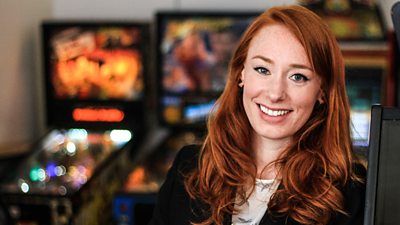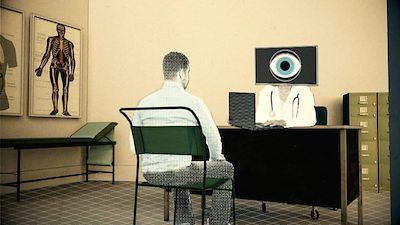The BEST episodes directed by Catherine Gale

#1 - The Joy of Winning
BBC Documentaries - Season 2018 - Episode 209
How to have a happier life and a better world all thanks to maths, in this witty, mind-expanding guide to the science of success with Hannah Fry. Following in the footsteps of BBC Four's award-winning maths films The Joy of Stats and The Joy of Data, this latest gleefully nerdy adventure sees mathematician Dr Hannah Fry unlock the essential strategies you'll need to get what you want - to win - more of the time. From how to bag a bargain dinner to how best to stop the kids arguing on a long car journey, maths can give you a winning strategy. And the same rules apply to the world's biggest problems - whether it's avoiding nuclear annihilation or tackling climate change. Deploying 'The Joys Of...' films' trademark mix of playful animation alongside both oddball demos and contributions from the world's biggest brains, Fry shows how this field of maths - known as game theory - is the essential key to help you get your way. She reveals ways to analyse any situation, and methods of calculating the consequences of getting what you want. Expect tips on taking advantage of what your opponents do, but also pleasing proof that co-operation might get you further than conflict. Fry also hails the 20th-century scientists like John von Neumann and John Nash who worked out the science of success. They may not be household names, but they transformed economics, politics, psychology and evolutionary biology in the process - and their work, Hannah demonstrates, could even be shown to prove the existence and advantage of goodness. Along the way the film reveals, amongst other things, what links the rapper Ludacris, a Kentucky sheriff, a Nobel Prize winner and doping in professional cycling. And there's an irresistible chance to revisit the most excruciatingly painful and the most genius scenes ever seen on a TV game show, as Hannah unpacks the maths behind the legendary show Golden Balls and hails Nick Corrigan, the contestant whose cunning gameplay managed to break the suppos

#2 - Diagnosis on Demand? The Computer Will See You Now
Horizon - Season 2018 - Episode 12
Could a machine replace your doctor? Dr Hannah Fry explores the incredible ways AI is revolutionising healthcare - and what this means for all of us. This film chronicles the inside story of the AI health revolution, as one company, Babylon Health, prepare for a man vs machine showdown. Can Babylon succeed in their quest to prove their AI can outperform human doctors at safe triage and accurate diagnosis? Artificial intelligence is starting to transform healthcare beyond recognition - and tech companies large and small see almost limitless commercial opportunity. The ultimate vision is for accessible, affordable, better healthcare for almost everyone with a phone. In Britain this is already radically changing how some of us see our GPs. And in a world with a chronic shortage of doctors, but where even the very poor own mobile phones, it could be truly revolutionary. To witness this revolution from the inside, this film has privileged, behind-the-scenes access to ambitious British tech start-up Babylon Health, whose CEO Dr Ali Parsa declares with complete conviction 'we're going to do with healthcare what Google did with information.' Babylon launched its GP at Hand app in London in late 2017 and has already persuaded 30,000 Londoners to quit their old GPs to register instead for this NHS 'digital first' service, where patients discuss symptoms with an AI chatbot and see a doctor in minutes 24/7 via their phone. But GP at Hand's arrival has proved controversial - with many traditional GPs worried about the disruptive consequences for them and their patients, and others seeking to thwart its expansion nationwide. As this film reveals, there is a fundamental culture clash at play - between the 'move fast and break things' world of tech, and the cautious, diligent, often slow-moving world of medical science. So how will both camps respond when Babylon's AI attempts to pass the diagnostic sections of the Royal College of GPs exam? Amazingly, the NHS is today
#3 - The Joy of Logic
BBC Documentaries - Season 2013 - Episode 207
A sharp, witty, mind-expanding and exuberant foray into the world of logic with computer scientist Professor Dave Cliff. Following in the footsteps of the award-winning 'The Joy of Stats' and its sequel, 'Tails You Win - The Science of Chance', this film takes viewers on a new rollercoaster ride through philosophy, maths, science and technology- all of which, under the bonnet, run on logic. Wielding the same wit and wisdom, animation and gleeful nerdery as its predecessors, this film journeys from Aristotle to Alice in Wonderland, sci-fi to supercomputers to tell the fascinating story of the quest for certainty and the fundamentals of sound reasoning itself. Dave Cliff, professor of computer science and engineering at Bristol University, is no abstract theoretician. 15 years ago he combined logic and a bit of maths to write one of the first computer programs to outperform humans at trading stocks and shares. Giving away the software for free, he says, was not his most logical move... With the help of 25 seven-year-olds, Professor Cliff creates, for the first time ever, a computer made entirely of children, running on nothing but logic. We also meet the world's brainiest whizz-kids, competing at the International Olympiad of Informatics in Brisbane, Australia. 'The Joy of Logic' also hails logic's all-time heroes: George Boole who moved logic beyond philosophy to mathematics; Bertrand Russell, who took 360+ pages but heroically proved that 1 + 1 = 2; Kurt Godel, who brought logic to its knees by demonstrating that some truths are unprovable; and Alan Turing, who, with what Cliff calls an 'almost exquisite paradox', was inspired by this huge setback to logic to conceive the computer. Ultimately, the film asks, can humans really stay ahead? Could today's generation of logical computing machines be smarter than us? What does that tell us about our own brains, and just how 'logical' we really are...?